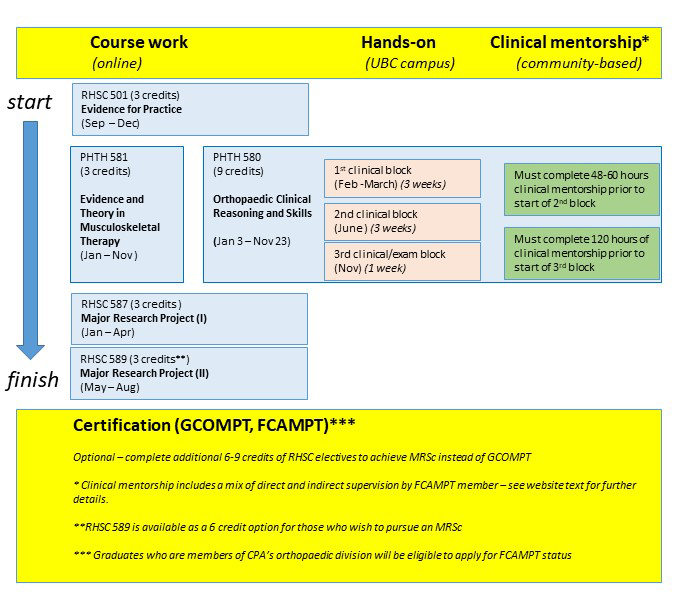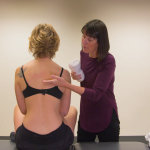Curriculum
The GCOMPT curriculum blends three types of learning – online course-work (blue), hands-on instruction at the UBC campus (pink), and a clinical mentorship assignment (green).

Coursework
 Courses are delivered and completed online, with essential content and links to readings, audio PowerPoint lectures and other resources available on the course website. Learners can organize the majority of their online learning activities to suit their personal schedules regardless of where they are located. PHTH580 (Orthopaedic Clinical Reasoning and Skills) includes three periods (7 weeks in total) of hands-on instruction in the plinth labs at the UBC Department of Physical Therapy in Vancouver, Monday to Friday full days. The student: instructor ratio will be no higher than 12:1.
Courses are delivered and completed online, with essential content and links to readings, audio PowerPoint lectures and other resources available on the course website. Learners can organize the majority of their online learning activities to suit their personal schedules regardless of where they are located. PHTH580 (Orthopaedic Clinical Reasoning and Skills) includes three periods (7 weeks in total) of hands-on instruction in the plinth labs at the UBC Department of Physical Therapy in Vancouver, Monday to Friday full days. The student: instructor ratio will be no higher than 12:1.
It is possible to take the courses over a longer period of time. RHSC501 must be taken first, and PHTH580/581 must be taken concurrently.
For those interested in pursuing the MRSc with a manual therapy focus, the descriptions of other coursework are available on the MRSc website.
Clinical Mentorship
The curriculum includes a mandatory clinical mentorship with an accredited mentor (FCAMPT: Fellow of the Canadian Academy of Manipulative Physiotherapists). It is the responsibility of the student to seek out and establish a mentorship agreement with an FCAMPT member. (This mentor will need to be approved by the GCOMPT program director). Any remuneration required by the mentor is the student’s responsibility.
- Shadowing/co-treating at the preceptor’s clinic with a 1:1 to 4:1 Learner: Mentor ratio. The Mentor should attempt to be present for at least 20 minutes of every hour of patient care by the learner.
- Supervision of assessment/treatment at the learner’s clinic in which the Mentor attends the Learner’s clinic to provide 1 – 4:1 feedback
- The Mentor may provide 1 to 2 hours of extra instruction at the end of the day or the next day and/or visit to practice specific techniques encountered while treating actual patients.
- Study group with your Mentor performing various Mock Scenarios and/or practical Clinical Reasoning cases: Mentor provides a mock scenario using volunteers/other physiotherapists who are not actual patients. The Learner: Mentor ratio can vary from 1 to 4:1.
- Controlled Teaching: Patient care outside of regular clinic hours focused on certain conditions with actual patients. The ratio of Learner: Mentor can vary from a 1 to 4:1 ratio.
For indirect Clinical Hours, Learners work in peer-group sessions in an orthopaedic and manual therapy physiotherapy practice, and the sessions are conducted without a Mentor present. Clinical scenarios or cases are presented and/or discussed and used to practise clinical reasoning and manual therapy skill.
- Hours spent in small study groups or “prep groups”
- Peer presentations i.e. case study presentations
- On-line case study discussions with fellow learners
During the completion of PHTH580, students will accumulate an additional 120 hours (85 indirect, 35 direct) of mentorship. A report from the clinical Mentor will comprise a portion of the mark required to pass PHTH580.
General course descriptions:
Development of knowledge and skills for critical review and use of evidence in making practice decisions that lead to the best client outcomes. The effective use of evidence in practice including required background research, methods of synthesizing information and the practicalities in applying evidence to practice.
The course emphasizes the development of knowledge, clinical reasoning and clinical skills related to the practice of advanced orthopaedic manual and manipulative physiotherapy. The effective use of evidence in practice as well as case-based learning is included to provide a framework for appropriate assessment and treatment planning and implementation. In–class clinical skills content will be taught and evaluated in accordance with the Standards Document set by the International Federation of Orthopaedic Manipulative Physical Therapists (IFOMPT).
In this course, students will acquire the knowledge and skills necessary to review and interpret scientific evidence as it pertains to manipulative therapy, and will develop advanced clinical reasoning skills that are central to the practice of orthopaedic manual therapy that leads to the best patient outcomes.
In this course, learners will identify a rehabilitation practice problem relevant to orthopaedic and manipulative physical therapy for further study, analyze the organizational context in which the problem is occurring, review the literature relevant to a problem, and develop proposals to examine, minimize or resolve practice problems.
The specific objectives will vary for each learner and will be directed by the learners' research questions relevant to orthopaedic and manipulative physical therapy (developed in 587), however, through the course website learners will present their project findings to peers, examine the implications of their work for rehabilitation practice, and where appropriate, assess the extent to which the findings will be transferred to rehabilitation practice.
Prior learning assessment for FCAMPT members:
Physiotherapists who have already received FCAMPT qualification can apply for PLA standing (prior learning assessment) in PHTH 580 and PHTH 581. This option may be useful for those FCAMPT’s who would like to pursue an MRSc degree, and who would like to receive credits (12) for their previous learning. Please contact us for more details if you are considering pursuing this option.